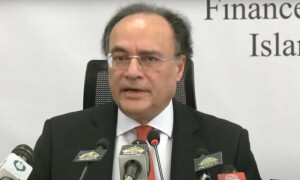Federal Minister for Planning, Development and Special Initiatives, Prof. Ahsan Iqbal, has underscored the importance of trade-led peace and economic cooperation across South and Central Asia, calling for greater regional integration through strategic connectivity projects.
He made these remarks while addressing a high-profile launch event of a landmark research report on the feasibility of an East-West Economic Corridor connecting South and Central Asia. The event was attended by diplomats, experts, and development partners, including the Ambassador of Kazakhstan, H.E. Yerzhan Kistafin.
The study, jointly developed by RAND Corporation with support from the Junaid Family Foundation and the RAND Centre for Asia Pacific Policy Advisory Board, explores trans-regional economic opportunities against the backdrop of shifting global economic dynamics.
“South and Central Asia share deep-rooted civilizational and commercial ties,” Minister Iqbal said, adding that even as political borders have hardened, the logic of economic geography remains intact.
Three-year strategic roadmap unveiled by PIDE Senate
He stressed that landlocked Central Asian nations need access to global markets and that Pakistan, through its strategic ports in Gwadar and Karachi, is uniquely positioned to facilitate this connectivity.
He highlighted Pakistan’s role as a bridge between South Asia, China, and Central Asia, noting, “Our country lies at the heart of a 3-billion strong regional population; this geography must translate into economic opportunity.”
Citing the government’s 5Es Framework, especially its emphasis on Energy and Infrastructure, the Minister detailed Pakistan’s ongoing efforts to operationalise CPEC Phase-II and expand regional linkages through initiatives like the Central Asia Regional Economic Cooperation (CAREC) corridors.
Key infrastructure projects mentioned included:
- Upgradation of Gwadar Port
- Expansion of the ML-1 railway line
- Digitisation of customs and border procedures
- Development of Special Economic Zones (SEZs)
- Expansion of national power transmission networks
Priority projects in roads, railways and maritime must be shortlisted in first phase: Ahsan
“These initiatives are supported by significant investments through the Public Sector Development Programme (PSDP), with infrastructure and energy receiving the largest funding share,” he noted.
The minister emphasised that connectivity and cooperation cannot flourish in an environment shaped by “coercion, occupation, or hegemonic designs,” and stressed that sustainable peace is a prerequisite for meaningful trade across the region.
“The East-West Economic Corridor connecting Central Asia, Afghanistan, Iran, Pakistan, and India must move beyond aspiration; it requires actionable policies, political will, and trust among partners,” he said.
Reaffirming Pakistan’s commitment to a geo-economic foreign policy, the Minister concluded, “Pakistan advocates peaceful coexistence, regional integration, and shared prosperity. Our development vision, Uraan Pakistan, puts connectivity, trade, and inclusive growth at the centre of our national agenda.”
The report’s findings and Pakistan’s strategic roadmap signal growing momentum for a more interconnected and economically vibrant South and Central Asia




















Comments